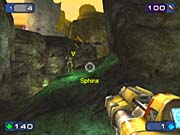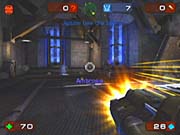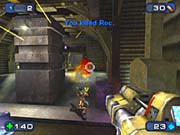The first-person shooter has traditionally been a PC genre. While there's always been room for such games on console systems, dating back to early entries like Wolfenstein 3D for the SNES and Doom for the Sega 32X, console hardware has had extreme difficulty when it comes to doing justice to these fast-moving games. Most ports are inferior to their PC counterparts, and most console-only first-person shooters (with a few notable exceptions) cut too many corners to garner support from anyone who has seen what a first-person shooter could be, given the proper hardware. Over the years, the playing field has evened out quite a bit, making room both for successful ports of PC shooters and entirely new console-specific games. Unreal Championship falls somewhere in between, as it's more or less the Xbox version of the recently released Unreal Tournament 2003, which is a fast-paced, multiplayer-focused PC shooter. It also happens to be one of the first online games available for Microsoft's newly launched Xbox Live service, giving it a leg up on the console-based competition and making the choice between playing shooters on a PC or on a console closer than ever before.

Unreal Championship sets up its combative events as a sort of futuristic team sport, though this is really exhibited only in the game's intro movie and the loading-screen text that describes each level. The game's single-player component is simpler than UT2003's--rather than drafting your team one player at a time and trading team members around as you go, you'll simply pick which bots you want to fight at your side and go from there. The single-player ladder starts with team deathmatch and works you through the rest of the team-based game types, including capture the flag, double domination, and bombing run.
Capture the flag and team deathmatch adhere to the standards of the genre. Double domination is a twist on the domination game found in the first Unreal Tournament. Here, there are two control points in each level, and a team scores by holding both points for a specific period of time. Bombing run is a new twist on one-flag capture the flag in which each team has a base with a goal ring in it and a ball appears in a central location on the map. Players score for their team by taking the ball to the opposing team's goal and then jumping through it for seven points or throwing the ball in for three points. Ballcarriers can't fire any weapons, but the ball can be passed from player to player. Unreal Championship also features a standard free-for-all deathmatch.
One spot where Championship differs a lot from Unreal Tournament 2003 is in the way it handles the game's different characters. In UT2003, each character had his or her own set of stats in a few categories and a preferred weapon, but this came into play only when that character was being controlled by the computer. In Unreal Championship, the characters' different skills and affinities come into play even when you're controlling the action. There are a handful of different races, and the manual is annoyingly vague when it comes to the differences, but the basic gist is that robots can jump high, the Egyptian-looking anubans earn adrenaline (which is used to execute certain special moves) faster, and juggernauts are the slow, tough guys. In addition to that, each individual character in the game has a weapon preference. The character will start with that weapon every time he or she spawns, and further still, there are three affinity types that give the player a higher ammo maximum for that weapon, increased attack power, or a higher rate of fire.

This is an interesting twist in a genre known for its varied and colorful yet functionally identical player models, but it also seems like it throws the balance off a bit. Having a rocket launcher on hand every time you spawn is a serious advantage, and the ability to fire it faster than other characters almost seems unfair. For one thing, it would have made racking up killing sprees super easy in full games if Unreal Championship had included that classic UT recognition system, but for some reason it doesn't. UT2003's interesting adrenaline system is included, however. As you score or pick up special adrenaline pills, your adrenaline counter rises. When it reaches 100, you can tap out some directions on the control pad that activate special power-ups, like super speed, invisibility, regeneration, or berserk power. The adrenaline system gives you some flexibility in how you play, and it can tilt the odds in your favor occasionally. It's always fun to turn the tables on the opposition.
The character-specific abilities and weapon options can be disabled with one of the game's many "mutators," which are a small set of lesser options that can be toggled in any game type. These actually have the ability to make serious changes to the gameplay. Some of the included mutators are low-gravity mode, one-weapon arena mode, regeneration, and "instagib," which arms every player with enhanced shock rifles that can kill with one hit and have infinite ammo. Combining different mutators and game types can make for some pretty unique matches.
The game has lots of single-player options, letting you configure bot matches any way you please. You can also play in split-screen mode or via system link, but the real draw of Unreal Championship is its Xbox Live support. The game supports a theoretical maximum of 16 players online, though it will suggest that you host smaller games if your connection isn't up to snuff. Of course, if you're lacking in bandwidth, you can still join larger games. The game features the standard collection of Xbox Live options, from quickstart to optimatch to voice masking, along with friends list support. Unreal Championship's voice support works pretty well when playing in the team-based game modes. In larger deathmatch games, though, players are separated into a couple of different chat channels, presumably to conserve bandwidth. The game has a decent ranking setup, giving you fast access to weekly or monthly rankings for all of the game's different game types. Unreal Championship may one day also be supported with downloadable content like new maps, models, and game modes, but nothing was available in the game's first week of release.

However, the maps already included with the game, which vary widely in size and style of design, should keep most players busy long enough for the developers to design new maps or, with any luck, acquire the best user-made maps and mods for UT2003 and release them for Xbox users to play. Regardless of the map, network performance tends to be fine in games with smaller numbers of players, and most DSL users should be able to host at least a five-player game. However, considering that Xbox Live is subsidized by subscription fees, you'd think that Microsoft would be able to provide a number of high-speed 16-player servers. While there are some dedicated 16-player servers out there, 16-player servers that don't lag like crazy are nearly impossible to find when compared with the large number of smaller servers on the network.
A first-person shooter is only as good as its guns, and Unreal Championship features a refined set of the weapons that helped make Unreal famous. Each gun has a primary and alternate fire mode, both of which are mapped to the controller's two analog triggers. The default weapon is a basic assault rifle, though its alternate fire will launch small grenades. From there you have the rocket launcher, a scope-mounted lightning gun, the goo-spewing biogun, a shotgun-like flak cannon, and a few others. The weapons feel pretty balanced most of the time, though the character-based weapon affinities throw that off a bit. A damage-enhanced or rate-of-fire-boosted chaingun chews through both ammunition and opposing players with alarming speed.
The PC first-person shooter genre has also been a playground used to show off the latest and greatest in 3D graphics hardware technology. Unreal Tournament 2003 puts on a very good show when run on a PC powerful enough to handle it, and Unreal Championship does a solid job of bringing that game's impressive visuals to the Xbox. The game definitely doesn't look as sharp as its PC counterpart, but it still has a nice look to it. The character models are well defined and the environments are detailed, and for the most part the game runs at a playably smooth frame rate. However, large areas and areas that are full of other players tend to bog down quite a bit, which will making aiming difficult with those analog controls. In a worst-case scenario, a small corridor with 10 players running around in it will slow the game down to a near crawl. Also, the animation isn't quite up to snuff. It looks pretty good in offline games, but during online play it almost seems like some corners were cut to keep bandwidth use down. So human players don't move with the same sort of fluidity you'd expect, even in low-ping, low-player-count settings.

The game's sound effects are great. Even though almost all the weapons are weirdly futuristic, the sound effects are really thunderous, providing the sort of kick you'd expect from this sort of arsenal. The entire game feels very bass-heavy, from the rocket explosions to the menu selection noises. Overall, the game makes use of the Xbox's built-in Dolby Digital support, and it does so with clarity and range. The game's music fits the action pretty well, but it can get tedious in longer matches, and support for custom soundtracks would have been a welcome addition.
Unreal Championship is a great game that is filled with action-packed, bloody shootouts that are especially fun online, but it lacks polish in a few spots. The frame rate issues are frequent enough to get in the way, and the laggy network play in higher-capacity games is another unfortunate blemish. It's certainly worth owning and playing, especially for anyone looking for an alternative to MechAssault, but anyone with a PC powerful enough to run Unreal Tournament 2003 would be better served by that installment in the series.